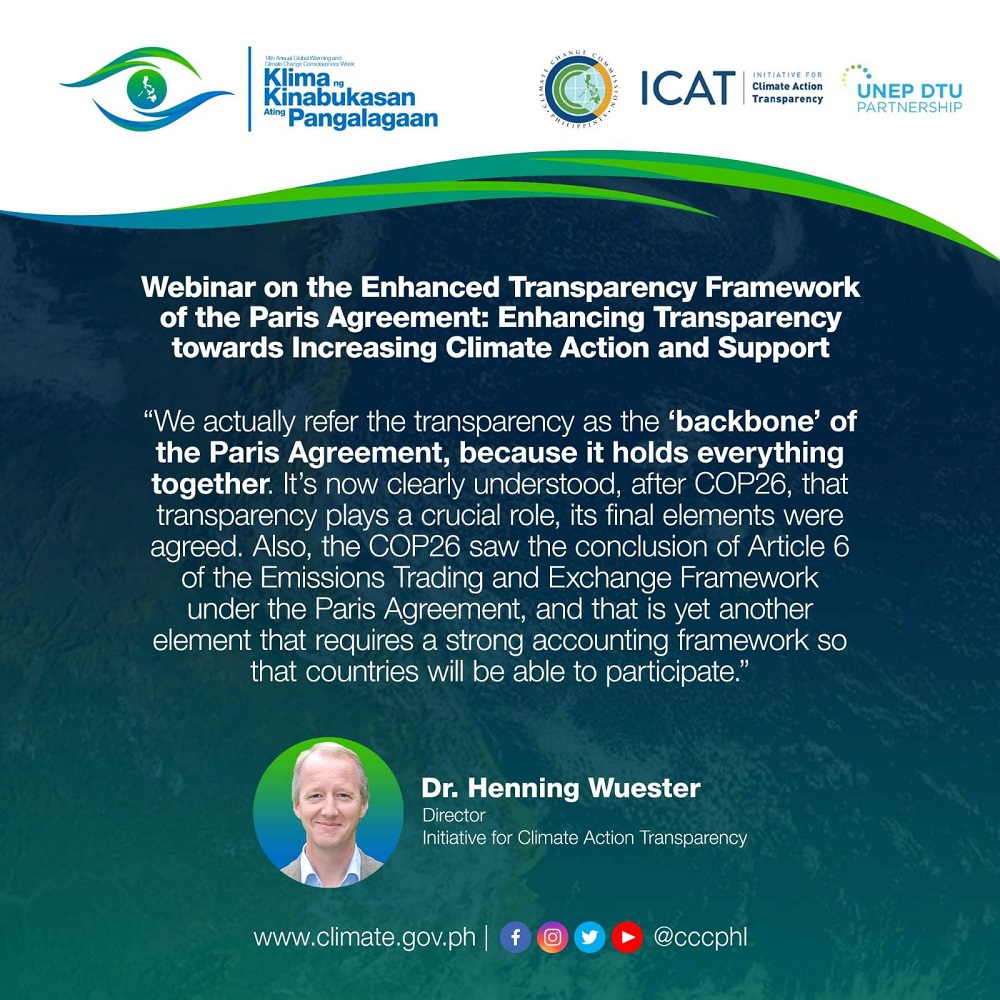
December 03, 2021 Friday

MANILA, 4 December 2021 — The Climate Change Commission (CCC), with the Initiative for Climate Action Transparency (ICAT) Project of the UNEP-DTU Partnership, conducted a webinar on the Enhanced Transparency Framework of the Paris Agreement, during the observance of the 14th Global Warming and Climate Change Consciousness Week.
The webinar, entitled, “Enhanced Transparency Framework of the Paris Agreement: Enhancing Transparency Towards Increasing Climate Action and Support” presented the measurement, reporting, and verification (MRV) systems in line with the transition to the Enhanced Transparency Framework and provide an overview of options on tools and methodologies that may be useful for sectoral and national reporting on climate action and support.
“The Enhanced Transparency Framework is a central component to make the Paris Agreement operational. Through proper MRV systems, we can measure our collective progress in mitigating climate change, and assess what we still need to do, and where we can get support to expand programs on climate action,” said CCC Commissioner Rachel Herrera.
“We actually refer to transparency as the ‘backbone’ of the Paris Agreement, because it holds everything together. It’s now clearly understood, after COP26, that transparency plays a crucial role, its final elements were agreed. Also, the COP26 saw the conclusion of Article 6 of the Emissions Trading and Exchange Framework under the Paris Agreement, and that is yet another element that requires a strong accounting framework so that countries will be able to participate,” said Dr. Henning Wuester, ICAT Director.
The participants consisted of agencies involved in MRV/M&E of climate change adaptation, mitigation, including those in-charge of climate-relevant data and information management systems and frameworks, were introduced to the general information on the ICAT initiative, overview of the Enhanced Transparency Framework under the Paris Agreement, Philippine initiatives on transparency in climate action and support, and tools and methodologies for transparency.
“We are providing support to assess policies and we also look at integrating transparency at the subnational level and also non-state actors, and currently we are also developing more work and methodology to support countries to engage in mobilizing finance for climate action transparency,” said Randa Ahmed, ICAT Programme Management Officer.
“The COP26 also allowed the development of outlines for the Biennial Transparency Report (BTR). Now we have a structure for BTR, that would be common to all parties, and that would be facilitating basically the review and the global stocktake afterwards. Then we also have the outline of the national inventory document and the technical expert review report. All of these go towards the uniformization and this would facilitate the aggregation of data and make the global stocktake exercise a bit easier than if having different reporting format. This is a good step in the right direction towards our aim,” said Fatima-Zahra Taibi, Senior Advisor of UNEP-DTU Partnership.
“Even prior to signing the UNFCCC, we already had come up with an institutional arrangement for working on climate issues. In 1991 we formed an Interagency Committee on Climate Change. Over the years we’ve developed several policies and measures, even strategies, to help us monitor and track the support that we are getting for us to be able to implement our climate actions,” said Sandee Recabar, of the Implementation Oversight Division of CCC.
“The ICAT toolbox is an important component of what we offer from ICAT – to build and develop capacity and provide effective support to developing countries. We developed this toolbox in collaboration with our major partners in order to respond to developing country needs,” said Dr. Hannah Swee, Technical Specialist-Environmental of ICAT.
The ICAT Project supports developing countries in improving their capacity to establish transparency systems for climate action and support in line with the Paris Agreement and its Enhanced Transparency Framework.
In the Philippines, this Project supports existing efforts in implementing a robust and sustainable measurement, reporting, and verification (MRV) system for adaptation, mitigation, and support through the conduct of stocktake and needs analyses and production of relevant tools.
ICAT is implemented by the UNEP-DTU Partnership with support from the German Federal Ministry for Environment, Nature Conservation and Nuclear Safety, Italian Ministry for Environment, Land and Sea Protection, Children’s Investment Fund Foundation, and ClimateWorks.
Watch the replay of the webinar by visiting the Facebook Page of the Climate Change Commission or by clicking this link: https://www.facebook.